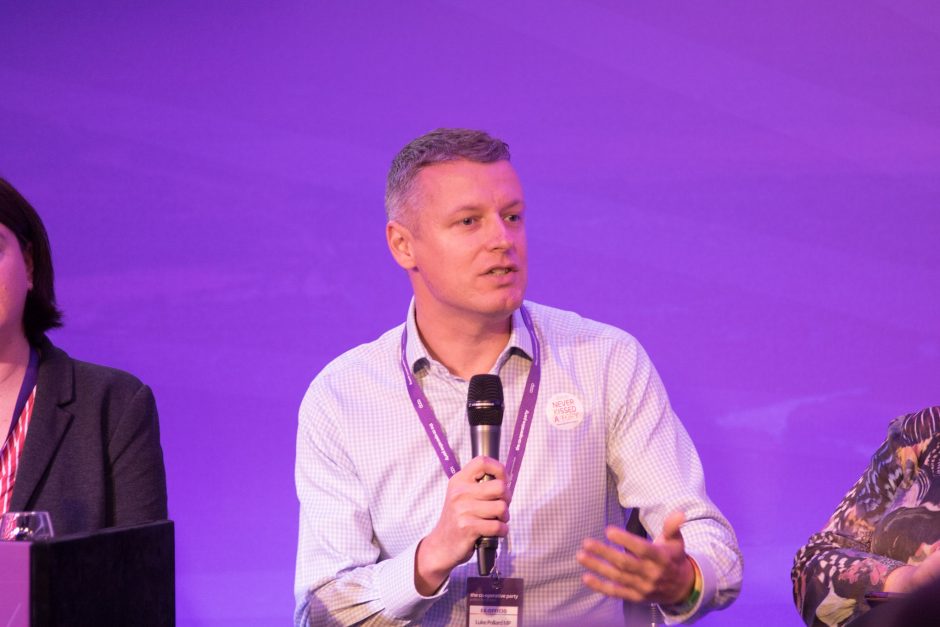The UK’s exit from the European Union was one of the most debated topics at the Co-operative Party’s annual conference in London, with Q&A sessions and fringe events looking at the potential impact on the agricultural and financial sectors.
In his conference speech, Labour leader Jeremy Corbyn said that in order to build a new high-investment economy for the 21st century, Britain had to get Brexit right.
“That means securing full access to the single market and using the powers we get back from Brussels to help transform our economy,” he said.
In an interview with Co-op News, he added that he was “determined” to secure access to the European markets and also make sure regulations were protected and the UK did not become the “off-shore tax heaven of Europe”.
“The EU has given quite a lot of support to co-ops but the legislation in Britain is rather weak where co-ops are concerned,” he said.
“I want a good relationship with Europe, I want EU nationals to receive full rights to remain plus family reunion rights. I also want to protect these regulations that we have achieved but also to have that day-to-day working relation through universities, through education, through environment issue and membership of the agencies that are part of the EU.”
The Labour leader confirmed he was involved in discussions in Brussels and that he aimed to secure access to the single market beyond a two-year transitional period.
“As an economy, we cannot but be involved with Europe. Fifty percent of our trade is with Europe now. We have to have that close trading relation through all the time. We are part of the European continent we cannot move a country. And so we are going to remain there.”
In his speech, Mr Corbyn also expressed concern over the lack of progress in the negotiations between the Tory government and the EU.
“With each passing day, they are driving us closer to a ‘no deal’ Brexit. Let’s be clear: no deal is the worst possible deal. It would leave us with World Trade Organisation tariffs and restrictions instead of the full access to European markets we need.
“The risk would be that key manufacturers leave for the European mainland taking skilled jobs with them. In sector after sector, ‘no deal’ could prove to be an economic disaster,” he said.
Elsewhere at the conference, Labour/Co-op peer Baroness Hayter said Labour would look for the best ways of securing access to the single market, and said remaining in the customs union would be crucial to a good trading relationship with the EU as well as stability in Northern Ireland.
And she insisted that Parliament should have a say on the final withdrawal bill. “It shouldn’t be ministerial, it should be the House of Parliament’s decision,” she said.
MP Paul Sweeney added: “The idea of single markets comes with a set of rules and regulations. The Labour Party’s objective is to defend the level playing field to reduce the harm.”

Luke Pollard, elected Labour/Co-op MP for Plymouth in June, said the export of certain products was important for local economies; for instance, cuttlefish is exported from his constituency to Italy and Portugal.
“Instead of it being a fixed position that Labour has, it has been a journey – reflective of the way the public is starting to understand and realise what is being said,” he said. “If we had another referendum today I think Plymouth will still vote to leave. People will say let’s get on with it. We need to provide a vision. We need to provide a positive future. We need to be ruthless about presenting a co-op vision of Britain.”

In a separate session on the impact of Brexit on co-ops in financial services, MEP Alex Mayer argued that co-ops were more resilient in times of crisis. But she warned that many regulations adopted at EU level, which are now part of UK law, cannot be “cut and pasted”.
“EU organisations are watching that there is a fair playing field,” she said.
Welsh first minister Carwyn Jones said he wanted more co-operation between the UK government and the Welsh and Scottish governments.
“Leaving the EU is the most significant challenge of our age,” he added. “A lot of businesses don’t export but are rooted in the supply change. The idea that no deal is better than a bad one is highly dangerous –the worst deal is no deal.”
He added that 68% of Welsh exports went to the EU. “Brexit can’t undermine development,” he said.
With structural changes underway in the agricultural sector, co-operatives and co-operation can play an important role in sustaining and developing different aspects of the agri-food supply chain. A report commissioned by the Wales Co-operative Centre looked at the potential of deeper co-operation in the agricultural sector in Wales.
One of the report’s authors, Jon Parker, said the findings suggested co-ops should be innovative, not afraid to move into new areas of knowledge transfer and collective sharing of market intelligence to meet the challenges of Brexit. They should engage and communicate their values to local people to highlight the benefits they bring to the local economy, he added.
“Post Brexit, the worst scenario is punitive tariffs,” added Huw Irranca-Davies AM, a former UK environment minister. He warned that Brexit could lead to a race to the bottom for cheap food, leading to a decline in regulation and food safety standards. Co-ops could respond to this by using co-op values to put real resilience in the sector and delivering for people, he argued.
Co-ops should also make the case for co-operation among their members, who may not even be aware that they are part of a co-op, he said.
“When farmers buy input for farms like fertilisers they are not thinking where they are buying it from even if it’s a co-op,” he added. “For example, a farmer and a son arguing whether to buy a machine through the co-op rather than cheaper online. It has to do with communication and how co-ops are explained.”
In a fringe session, Co-op Party chair Gareth Thomas said the organisation would consult with its membership on Brexit to reach a collective view.
“We should listen to businesses particularly when it comes to Brexit,” he added in his speech.